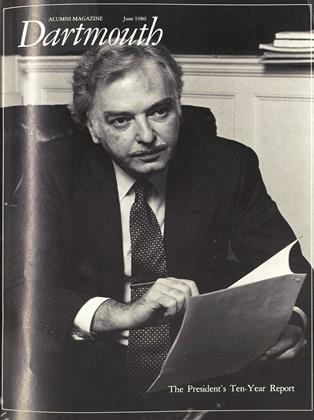Alfred T. Quirk '49, director 0f admissions, recently shared a few facts ana figures concerning the new class of 1984 The Admissions Office was aiming for a class of 1,060 students a figure set by the Board of Trustees and by mid-May 1,099 of the successful candidates for admission had indicated their plans to matriculate at Dartmouth. The number of candidates admitted is greater than the anticipated class size, Quirk explained, because of attrition to other schools over the spring and summer. According to Quirk's estimate, if the class size ends up on target, there will be 657 men and 403 women enrolled a ratio of 1.63:1 compared to a 2.21:1 ratio for the class of 1983. Quirk didn't offer an exact figure for the number of alumni children admitted, but he said the count tends to fluctuate from year to year between 12 and 17 per cent. "This year's percentage is as high as it was in the 19505," he noted.
Dartmouth received a total of 7,700 applications this year, down about eight per cent from last year. The general five- year trend at institutions like Dartmouth has been for the number of applications from men to level off and for the number of applications from women to increase. Quirk said he expects that pattern to con- tinue. Late this spring, Dartmouth's "yield" on the applicants who were ad- mitted was about 60 per cent, compared to 56 per cent for the Class of'B3 at the same time last year. The usual anticipation is for a yield of about 55 per cent.
There has been all kinds of speculation about the reasons for the eight per cent decline in the total number of applications a decline that wasn't experienced, at least to the same degree, by other Ivy in- stitutions. No one can say for sure what happened. Quirk simply said he'd "take good publicity over, bad publicity any day." This spring, Dartmouth received some good publicity that might have had something to do with the comparatively high yield rate, which is among the best in the Ivy League: At the suggestion of Mark Brown and Christopher Cannon, both juniors, more than 500 undergraduates volunteered to participate in a "phone-a- thon" to congratulate potential members of the new class on their admission and to answer any questions the successful applicants might have. It wasn't a high- pressure recruiting tactic, organizes pointed out, but an attempt to share enthusiasm about Dartmouth.
Another kind of soft-sell with an equally productive yield took place over the same set of telephones at Hopkins Center: 327 students placed calls on behalf of the Alumni Fund and obtained 476 pledges totaling almost 526,000.
Article
-
 Article
ArticleAlumni Fund Records 1915 to 1947
February 1948 -
 Article
ArticleTennis Champ Steve Graves '20 Aims for the Sky
January 1975 -
 Article
ArticleNice Outcome
June 1993 -
 Article
ArticleMascot Prospect Linked to Auto Injuries
NOVEMBER 1996 -
 Article
ArticleA Wall Hoo Wah!
February 1951 By C. E. W. -
 Article
ArticleCROSS COUNTRY
DECEMBER 1969 By JACK DEGANGE









